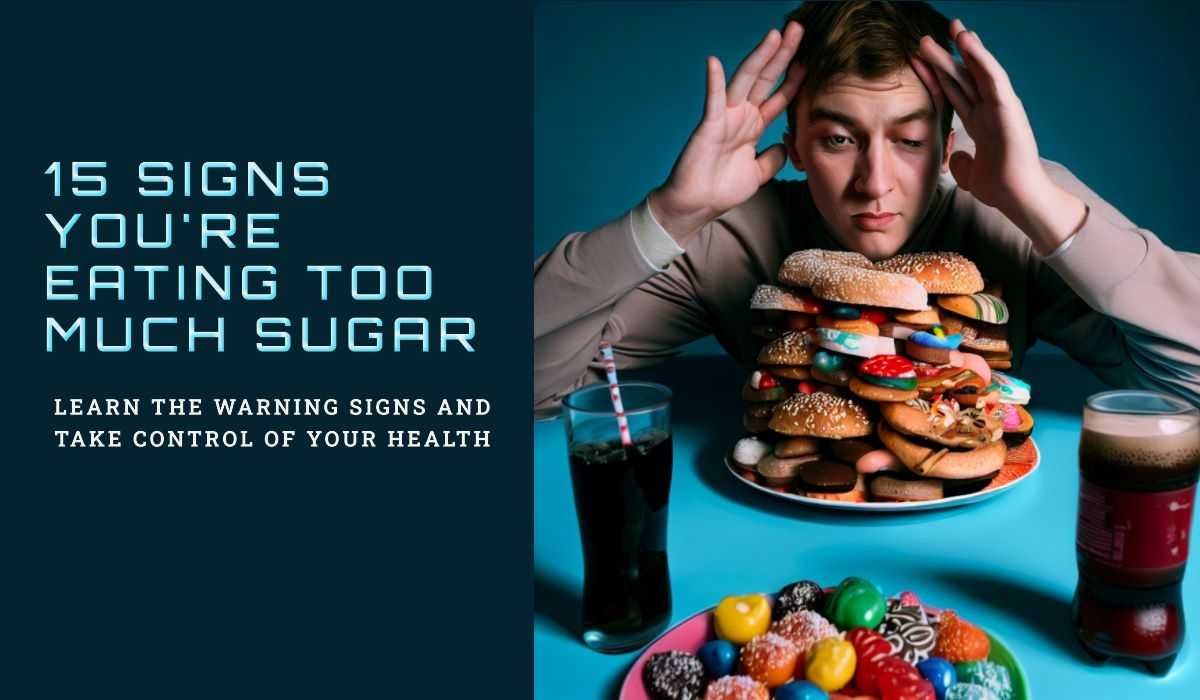15 Signs Of Eating Too Much Sugar: How to Identify the Warning Signs

Are you craving that sweet, sugary goodness? Well, buckle up because this article is about to burst your sugar-coated bubble.
We’ve all heard the warnings about the dangers of consuming too much sugar, but do we really know what signs to look out for? Prepare yourself for a reality check as we dive into 15 telltale signs that indicate you may be overindulging in sugar.
It’s time to face the bitter truth and take control of your health.
Signs Of Eating Too Much Sugar
If you constantly find yourself craving sugary treats throughout the day, feeling tired and sluggish even after a full night’s sleep, and noticing unwanted weight gain, it might be time to take a closer look at your sugar intake. These are all signs that you may be consuming too much sugar in your diet.
Additionally, if you seem to catch every cold that comes around and notice that your taste buds have become dull and less sensitive to flavors, it could also be related to excessive sugar consumption.
1. Sugar Cravings
When you’re eating too much sugar, you’ll start experiencing intense cravings for it. These cravings can be difficult to resist and may lead to overconsumption of sugary foods and drinks.
Here are three signs that indicate you’re having sugar cravings:
- Constant thoughts about sugary treats: If your mind is constantly occupied with thoughts of cookies, cakes, or candy, it could be a sign that your body is craving sugar.
- Feeling irritable or moody: When your blood sugar levels spike and then crash after consuming a lot of sugar, it can cause mood swings and irritability.
- Difficulty controlling portion sizes: Consuming excessive amounts of sugar can disrupt the hormones responsible for regulating appetite, making it harder to control portion sizes and leading to overeating.
By being aware of these signs, you can take steps to reduce your sugar intake and make healthier choices for overall well-being.
2. Fatigue
Feeling tired and lacking energy can be a common symptom of consuming excessive amounts of sugar. When you eat too much sugar, your blood sugar levels spike, leading to a surge of energy. However, this is short-lived and followed by a crash, leaving you feeling fatigued and drained.
High sugar intake also affects your sleep quality. It disrupts your natural sleep cycle, making it harder for you to fall asleep and stay asleep throughout the night. Additionally, consuming too much sugar can lead to inflammation in the body, which further contributes to fatigue.
To combat this fatigue, it is important to reduce your intake of sugary foods and focus on a balanced diet that includes whole grains, lean proteins, fruits, and vegetables.
3. Weight Gain

To avoid weight gain, it’s important to be mindful of your sugar intake and focus on a balanced diet. Consuming too much sugar can lead to an increase in body weight due to its high calorie content and the way it affects your metabolism.
When you consume excessive amounts of sugar, your body releases insulin to help process it. Insulin promotes fat storage and inhibits fat burning, leading to weight gain over time. Additionally, high sugar intake can cause cravings and overeating, as it doesn’t provide sustained energy or satiety.
Studies have shown that reducing sugar intake can result in significant weight loss and improved overall health. [1]
Therefore, monitoring your sugar consumption is crucial for maintaining a healthy weight and preventing unnecessary pounds from creeping on.
Related: LeptiSense Review (JayLab Pro): Does it Really Help You Lose Weight?
4. Frequent Colds
If you frequently catch colds, it may be helpful to examine your overall health and lifestyle habits.
One possible culprit for your constant sniffles could be your sugar intake. Research suggests that consuming excessive amounts of sugar can weaken your immune system, making you more susceptible to infections like the common cold. [2]
When you consume too much sugar, it can suppress the activity of immune cells responsible for fighting off harmful bacteria and viruses. Additionally, high sugar intake has been linked to chronic inflammation, which further compromises your immune function.
To reduce your risk of frequent colds, try cutting back on sugary foods and beverages and focus on a balanced diet rich in fruits, vegetables, lean proteins, and whole grains.
PRO TIP: Don’t forget to prioritize good sleep hygiene and stress management as well since they play a crucial role in maintaining a strong immune system.
5. Dull Taste Buds
Excessive sugar consumption can dull your taste buds, affecting your enjoyment of various foods. When you consume too much sugar, it overstimulates the taste receptors on your tongue. This constant bombardment of sweetness can lead to a decrease in sensitivity over time.
As a result, you may find that your favorite foods no longer taste as flavorful as they once did.
Studies have shown that high sugar intake can alter your perception of taste, making savory and bitter flavors less noticeable. [3]
This can be problematic because these flavors are important for a balanced diet and can help prevent overeating.
If you notice that you’re constantly craving sugary foods or finding it difficult to enjoy healthier options, it might be worth considering if excessive sugar consumption has dulled your taste buds.
By reducing your sugar intake and opting for whole, unprocessed foods, you can begin to retrain your taste buds and regain the full enjoyment of all flavors.
6. Brain Fog

If you find yourself feeling a bit foggy and struggling to concentrate, it may be a sign that you’re consuming too much sugar. This phenomenon, commonly known as ‘brain fog,’ is characterized by mental fatigue, difficulty focusing, and a general sense of sluggishness.
When you consume excessive amounts of sugar, your blood sugar levels spike rapidly, causing an initial burst of energy followed by a crash. This rollercoaster effect can disrupt the normal functioning of your brain and impair cognitive abilities.
Research has shown that high sugar intake can lead to inflammation in the brain and negatively impact memory and learning processes. [4]
Additionally, excessive sugar consumption has been linked to an increased risk of developing conditions such as depression and anxiety.
To combat brain fog and promote optimal cognitive function, it’s important to reduce your intake of sugary foods and opt for healthier alternatives instead. By doing so, you’ll not only improve your concentration but also support overall brain health.
Related: Neuroactiv6 Review: Best Brain Boosting Nootropic?
7. Skin Problems

To help improve your skin, it’s important to be mindful of your sugar intake. Excessive consumption of sugar can lead to various skin problems.
Here are four signs that you may be eating too much sugar:
- Acne: High sugar intake can increase insulin levels, leading to inflammation and excess oil production, which contribute to acne breakouts.
- Premature aging: Sugar attaches to proteins in the body through a process called glycation, resulting in the formation of advanced glycation end products (AGEs). AGEs can damage collagen and elastin fibers, causing wrinkles and sagging skin.
- Skin dullness: A high-sugar diet can disrupt the balance of beneficial bacteria in your gut, leading to an overgrowth of harmful bacteria. This imbalance can manifest as dull and lifeless-looking skin.
- Eczema flare-ups: Studies have shown a link between high sugar consumption and increased incidence of eczema outbreaks [5].
By reducing your sugar intake, you can promote healthier skin and reduce the risk of these issues occurring.
8. Irritability
Cutting back on sugar can help reduce irritability. When you consume excessive amounts of sugar, it can negatively impact your mood and lead to increased feelings of irritability.
This occurs because high sugar intake causes a rapid spike in blood sugar levels, followed by a sudden drop, which can result in mood swings and irritability.
Additionally, consuming sugary foods and beverages can also disrupt the balance of neurotransmitters in the brain that regulate mood, such as serotonin and dopamine.
Research has shown that reducing sugar intake can have a positive effect on mental well-being and overall mood stability. [6]
By making conscious choices to limit your sugar consumption, you may experience improved emotional balance and decreased irritability throughout the day.
9. Feeling anxious
Feeling anxious? Limiting your sugar intake can help alleviate anxiety symptoms. Research has shown a strong link between excessive sugar consumption and increased anxiety levels. [7]
When you consume large amounts of sugar, it causes a rapid spike in your blood glucose levels, followed by a crash. This rollercoaster effect can lead to feelings of restlessness, nervousness, and even panic attacks.
Additionally, high sugar intake can disrupt the balance of gut bacteria, which plays a crucial role in regulating mood and emotions. By reducing your sugar intake, you are not only improving your physical health but also promoting better mental well-being.
Incorporate more whole foods into your diet and opt for natural sweeteners like honey or fruit instead of sugary treats to help manage those anxious feelings.
Related: Phytocet Reviews: Why This CBD Oil Is Taking The Market By Storm
10. Hunger
If you’re hungry, try incorporating more whole foods into your diet to satisfy your cravings.
Hunger can be a sign that you’re eating too much sugar. When you consume sugary foods, they quickly raise your blood sugar levels, giving you a burst of energy. However, this spike is followed by a rapid drop in blood sugar levels, leaving you feeling hungry and craving more sugar.
Whole foods such as fruits, vegetables, whole grains, and lean proteins can help stabilize your blood sugar levels and keep you feeling fuller for longer periods of time. These foods provide essential nutrients and fiber that can help regulate your appetite and prevent excessive sugar consumption.
So next time you feel hungry, reach for a healthy snack instead of a sugary treat to keep both your hunger and sugar intake in check.
11. Bloating
Incorporating more whole foods into your diet can help alleviate bloating.
Here are four reasons why you should consider making this change:
- Fiber-rich foods such as fruits, vegetables, and whole grains can promote healthy digestion and prevent constipation, reducing the chances of bloating.
- Drinking plenty of water throughout the day helps flush out excess sodium from your body, which can contribute to bloating.
- Consuming probiotic-rich foods like yogurt or kimchi can support a healthy gut microbiome, improving digestion and reducing bloating.
- Avoiding carbonated beverages and chewing gum can reduce the amount of air swallowed, decreasing the likelihood of feeling bloated.
By incorporating these dietary changes, you can reduce bloating and improve overall digestive health.
12. Sweet Cravings

To satisfy your sweet cravings, try incorporating healthier alternatives like fresh fruit or dark chocolate. These options can provide a natural sweetness without the excessive sugar content found in many processed treats.
By choosing healthier alternatives, you can still enjoy a sweet treat while reducing your overall sugar consumption. Fresh fruits offer essential vitamins and fiber, while dark chocolate contains antioxidants and is lower in added sugars compared to milk chocolate.
Making these swaps can help curb your sweet tooth while promoting better health.
13. Sleep Issues

Sleep issues can have a negative impact on your overall health and well-being. When you consume too much sugar, it can disrupt your sleep patterns and lead to various sleep problems.
Here are some signs that indicate you may be eating too much sugar:
- Difficulty falling asleep: Consuming excessive amounts of sugar can make it harder for you to fall asleep at night.
- Frequent waking up during the night: High sugar intake can cause disruptions in your sleep, leading to frequent awakenings.
- Restless or disturbed sleep: Eating too much sugar can result in restless and disturbed sleep, leaving you feeling tired and groggy in the morning.
It’s important to monitor your sugar intake and make necessary adjustments to promote better sleep quality and overall health.
14. Increased thirst
Increased thirst can be a potential indicator that you may be consuming excessive amounts of sugar. When you eat too much sugar, your body tries to balance the high levels of glucose in your blood by diluting it with water.
This leads to increased urine production and subsequently, increased thirst. So if you find yourself constantly reaching for a glass of water or feeling parched all the time, it could be a sign that your sugar intake is too high.
Excessive thirst is also commonly associated with diabetes, as high blood sugar levels can cause dehydration. If you have other symptoms like frequent urination, fatigue, and blurred vision along with increased thirst, it’s important to consult a healthcare professional for proper evaluation and diagnosis.
15. Frequent Urination
If you find yourself constantly needing to use the bathroom, it may be a sign of frequent urination. This can occur when you’re consuming too much sugar.
When you eat high amounts of sugar, your body tries to get rid of the excess glucose by excreting it through urine. The increased sugar levels in your bloodstream cause your kidneys to work harder to filter out and eliminate the sugar. As a result, you may notice that you need to urinate more frequently than normal.
If this is happening regularly and is accompanied by other signs of excessive sugar consumption, such as increased thirst and fatigue, it’s important to speak with a healthcare professional. They can help determine if your sugar intake is causing these symptoms and provide guidance on making dietary changes for better health.
Too Much Sugar Side Effects
If you consume too much sugar, you may experience several side effects that can negatively impact your health.
These include an increased risk of cavities due to the harmful effects of sugar on your teeth. Additionally, consuming excessive amounts of sugar has been linked to heart problems such as high cholesterol and triglyceride levels.
Moreover, studies have shown a potential association between high sugar intake and the development of certain types of cancer, joint pain, and high blood pressure.
1. Cavities

Having cavities is a clear sign that you’re eating too much sugar. When you consume sugary foods and drinks, the bacteria in your mouth produce acids that attack your tooth enamel, leading to cavities.
This is because sugar acts as food for the harmful bacteria in your mouth, causing them to multiply and produce more acid.
Over time, the repeated exposure to these acids weakens your teeth and creates small holes or cavities. It’s important to note that good oral hygiene practices such as brushing twice a day, flossing daily, and visiting your dentist regularly can help prevent cavities.
Additionally, reducing your sugar intake and choosing healthier alternatives can also contribute to maintaining good oral health.
Related: How to Reverse Your Teeth Cavities Naturally
2. Heart Problems
To maintain a healthy heart, it’s important to be mindful of the impact sugar consumption can have on your cardiovascular health. Excessive sugar intake has been linked to an increased risk of heart problems.
When you consume too much sugar, it can lead to weight gain and obesity, which are major risk factors for developing heart disease. Additionally, high sugar diets have been shown to raise blood pressure and increase levels of triglycerides, both of which are associated with an elevated risk of heart issues.
Furthermore, consuming too much added sugar can contribute to inflammation in the body, including within the arteries. This inflammation can lead to plaque buildup and narrowing of the arteries, which restricts blood flow and increases the likelihood of cardiovascular complications.
To protect your heart health, it’s crucial to limit your intake of sugary foods and beverages. Opt for whole foods like fruits and vegetables instead, as they provide essential nutrients without the negative effects of excessive sugar consumption. Remember that moderation is key when it comes to maintaining a healthy heart.
3. Cancer
Cancer can be influenced by excessive sugar consumption. Research studies have shown a link between high sugar intake and an increased risk of developing certain types of cancer.
When you consume too much sugar, it can lead to weight gain and obesity, which are known risk factors for various cancers including breast, colorectal, pancreatic, and endometrial cancer.
Additionally, excess sugar consumption can cause inflammation in the body, which has been associated with an increased risk of cancer development. Furthermore, high levels of insulin in the blood due to excessive sugar intake may promote the growth and proliferation of cancer cells.
To reduce your risk of cancer, it is important to limit your sugar intake and focus on a balanced diet that includes plenty of fruits, vegetables, whole grains, and lean proteins.
Related: Dr Otto Warburg Method To Cure Cancer
4. Joint Pain

Excessive sugar consumption can contribute to joint pain. When you consume too much sugar, it can lead to inflammation in your body. This inflammation can affect your joints and cause pain and discomfort.
Studies have shown that a high intake of sugar can increase the risk of developing conditions such as rheumatoid arthritis, which is characterized by joint pain and swelling. [8]
Additionally, consuming excessive amounts of sugary drinks and snacks can lead to weight gain. Extra weight puts added pressure on your joints, resulting in increased stress and potential damage. This can worsen existing joint pain or even lead to the development of new symptoms.
Remember, paying attention to your sugar intake not only benefits your overall health but also helps protect your joints from unnecessary pain and discomfort.
5. High Blood Pressure
Consuming excessive amounts of sugar can contribute to high blood pressure. When you consume too much sugar, your body releases insulin to help process it. Over time, this constant release of insulin can lead to insulin resistance, causing your blood pressure to increase.
Additionally, a high sugar intake can also lead to weight gain and obesity, which are major risk factors for developing high blood pressure. Research has shown that reducing sugar intake can significantly lower blood pressure levels.
It is recommended to limit added sugars in your diet and opt for natural sources of sweetness like fruits instead. By making these dietary changes, you can help maintain healthy blood pressure levels and reduce the risk of cardiovascular diseases associated with high sugar consumption.
6. Diabetes
If you thought high blood pressure was the only concern associated with consuming too much sugar, think again.
Another serious health condition that can result from excessive sugar intake is diabetes.
When you consistently consume large amounts of added sugars, your body’s ability to regulate blood sugar levels becomes compromised. This can lead to the development of type 2 diabetes, a chronic condition characterized by high blood sugar levels.
The excess sugar in your diet causes insulin resistance, meaning your cells don’t respond properly to the hormone insulin that helps regulate blood sugar. Over time, this can lead to elevated blood sugar levels and an increased risk of developing diabetes.
So, if you’re experiencing symptoms like frequent thirst, increased urination, unexplained weight loss or gain, or constant fatigue, it may be wise to examine your sugar consumption and consider making healthier choices for the sake of your overall well-being.
Related: Best Foods for Type 2 Diabetes: Delicious and Nutritious Options
7. Fatty liver disease
Fatty liver disease can develop as a result of consistently consuming large amounts of added sugars. When you consume excessive amounts of sugar, your liver tries to metabolize it by converting it into fat.
Over time, this can lead to a buildup of fat in the liver and cause inflammation, known as fatty liver disease. This condition is becoming increasingly common due to the high sugar content in many processed foods and beverages.
Research has shown that fatty liver disease is strongly associated with an increased risk of developing type 2 diabetes and cardiovascular diseases. [9]
It can also progress to more severe forms, such as non-alcoholic steatohepatitis (NASH) or cirrhosis. To prevent or reverse fatty liver disease, it is important to reduce your intake of added sugars and focus on consuming a balanced diet rich in fruits, vegetables, whole grains, lean proteins, and healthy fats.
8. Systemic inflammation
Reduce your intake of added sugars to prevent or reverse systemic inflammation. Consuming too much sugar can lead to chronic low-grade inflammation throughout your body, which is known as systemic inflammation. This type of inflammation has been linked to a variety of health issues, including heart disease, diabetes, and obesity.
By cutting back on sugary foods and beverages, you can reduce the levels of inflammatory markers in your blood and decrease your risk of developing these conditions. Here are four signs that may indicate you’re experiencing systemic inflammation due to excessive sugar consumption:
- Frequent fatigue or low energy levels
- Regular headaches or migraines
- Persistent joint pain or stiffness
- Skin problems such as acne or eczema
Taking steps to limit your sugar intake can help improve your overall health and well-being by reducing the harmful effects of systemic inflammation.
Types of sugars
There are different types of sugars that can be found in various foods. Some common types of sugars include glucose, fructose, and sucrose.
Glucose is the most basic form of sugar and is the primary source of energy for our bodies.
Fructose is naturally found in fruits and honey, while sucrose is a combination of glucose and fructose commonly found in table sugar.
It’s important to note that while all sugars provide calories, some sources like fruits also provide essential nutrients such as fiber, vitamins, and minerals.
However, excessive consumption of added sugars from processed foods and beverages can contribute to weight gain, tooth decay, and an increased risk of chronic diseases like diabetes and heart disease.
Being aware of the different types of sugars can help you make informed choices about your overall sugar intake.
Foods high in added sugars
If you’re looking to limit your intake of added sugars, it’s important to be mindful of the foods that are high in them. Here are four common culprits:
- Sugary beverages: Sodas, energy drinks, and fruit juices often contain a significant amount of added sugars. Opt for water or unsweetened beverages instead.
- Sweetened cereals: Many breakfast cereals are loaded with added sugars, even those marketed as ‘healthy’ options. Read labels and choose cereals with minimal sugar content.
- Processed snacks: Cookies, cakes, candies, and other sweets are obvious sources of added sugars. But even seemingly healthy snacks like granola bars can have a surprising amount of sugar. Look for low-sugar alternatives or make your own snacks using natural sweeteners.
- Sauces and dressings: Ketchup, barbecue sauce, salad dressings, and marinades can all contain hidden sugars. Check labels for sugar content or make your own sauces at home using herbs and spices.
By being aware of these high-sugar foods and making healthier choices, you can reduce your intake of added sugars and improve your overall health.
How to cut back on sugar
One way to decrease your sugar consumption is by gradually replacing sugary drinks with water or unsweetened beverages.
Sugary drinks, such as soda and fruit juices, are major sources of added sugars in our diets. By making this simple swap, you can significantly reduce your daily sugar intake.
Another effective strategy is to read food labels carefully and choose products that have little to no added sugars. Look for words like sucrose, high fructose corn syrup, and dextrose on the ingredient list – these indicate the presence of added sugars.
Additionally, be mindful of hidden sources of sugar in processed foods like condiments, sauces, and even seemingly healthy options like granola bars or flavored yogurts. Cutting back on sugar can improve your overall health and help prevent conditions like obesity and diabetes.
Frequently Asked Questions
Final Take
In conclusion, if you’ve noticed any of these signs, it’s time to reevaluate your sugar intake. Too much sugar can have detrimental effects on your health. It can lead to weight gain and increased risk of chronic diseases. It can also cause mood swings and low energy levels.
By understanding the different types of sugars and being aware of foods high in added sugars, you can take steps to cut back and improve your overall well-being. Remember, moderation is key when it comes to sugar consumption.
Read Next





